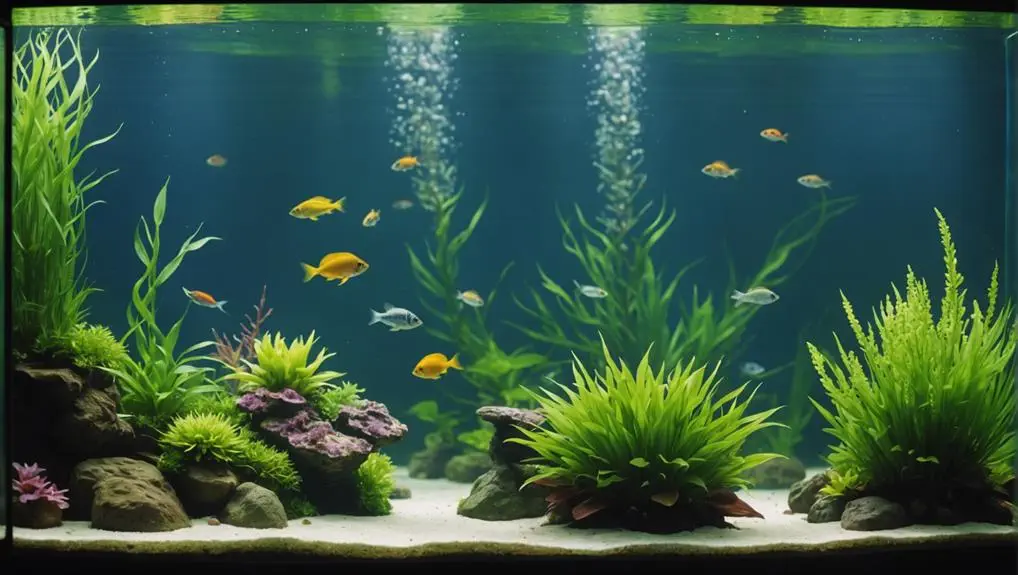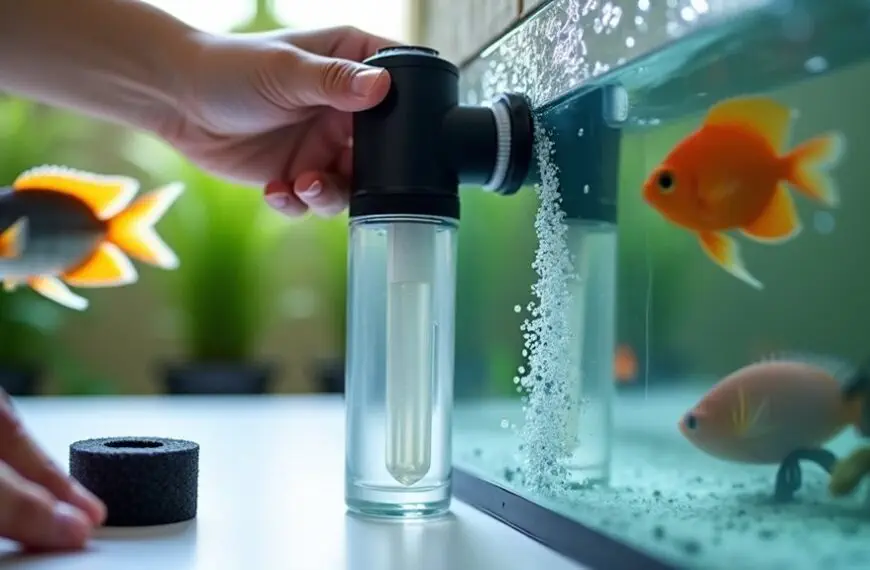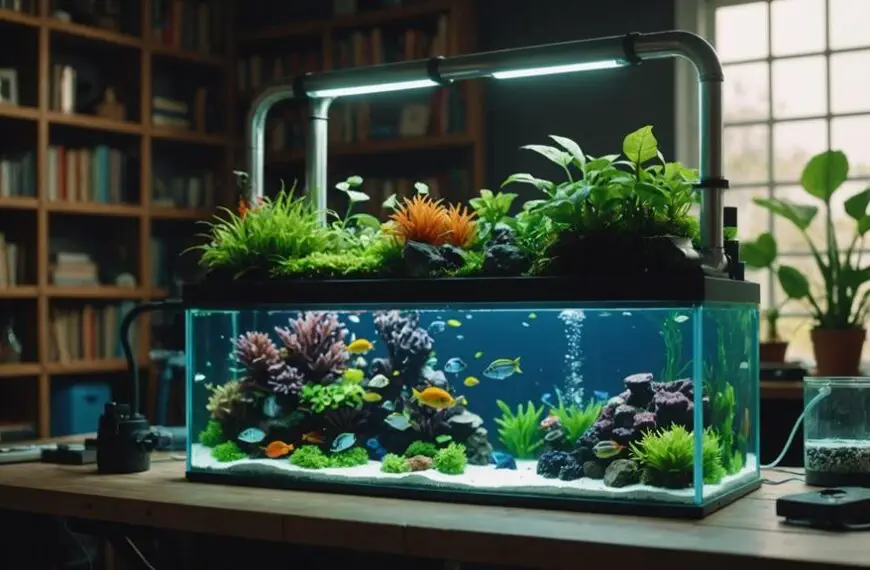Biological filtration is like having a personal aquarium superhero! It uses beneficial bacteria to break down harmful waste, turning it into safer substances, which is key for crystal-clear water. This not only boosts water quality but also keeps your fish healthy and stress-free. You'll spend less time fussing over water changes and chemical treatments, making your life easier. Plus, it supports a balanced ecosystem, helping plants flourish and creating a cozy home for your aquatic buddies. So, if you want to discover how to make your fish happier and your tank easier to maintain, stick around!
Contents
Enhanced Water Quality
When you choose biological filtration for your aquarium, you're actively enhancing water quality. This method employs beneficial bacteria to break down harmful substances, like ammonia and nitrite, which can seriously harm your fish and plants. By converting these toxins into safer nitrates, you're creating a healthier habitat for your aquatic friends.
Regular testing of water quality parameters, including ammonia and nitrite levels, is essential to ensure the effectiveness of your biological filtration system and maintain optimal conditions for your fish (essential test parameters).
Your biological filter plays a crucial role here. It helps establish those all-important bacterial colonies that work tirelessly around the clock, breaking down organic waste and maintaining stable water parameters.
As these bacteria do their job, you'll notice improved water clarity and overall quality—your fish will surely thank you for it!
Plus, by controlling excess nutrients, biological filtration can help keep those pesky algae blooms at bay. No one wants a tank that looks like a green soup!
With a balanced aquatic ecosystem, your tank can thrive in harmony. You're not just making your aquarium look good; you're supporting sustainable practices that lead to long-term health for your tank.
Reduced Chemical Use
When you think about keeping your aquatic environment healthy, reducing chemical use is a big win.
Biological filtration does the heavy lifting by naturally breaking down nasty toxins like ammonia and nitrite, which are harmful to fish and plants.
By promoting the establishment of beneficial bacteria, you won't need to rely on those harsh chemical treatments.
Plus, with fewer additives in the mix, your water quality remains stable, creating a happier home for your fish and plants without all the fuss!
Natural Toxin Breakdown
Biological filtration harnesses the power of beneficial bacteria to transform harmful ammonia from fish waste into less toxic nitrates. This process not only keeps your aquatic friends safe but also cuts down on the need for chemicals that can be toxic to fish.
Here's how biological filters help you serve your aquatic ecosystem better:
- Natural Breakdown: The bacteria in biofilters break down organic waste naturally, so you won't need to rely on synthetic chemicals like algicides.
- Cleaner Water: With biological filtration, you can see a significant reduction in harmful contaminants, enhancing water clarity without the need for frequent chemical treatments.
- Healthy Growth: By stabilizing nutrient levels, these systems allow for healthier plant growth, which naturally purifies the water and reduces your need for chemical additives.
Sustainable Water Quality Management
Sustainable water quality management relies on innovative solutions that minimize chemical use, and biological filtration stands out as a prime example.
You might be wondering how this works. Well, beneficial bacteria in biological filtration break down harmful pollutants naturally, reducing the need for chemical additives. This means you're not only helping to keep water cleaner but also creating a healthier environment for aquatic life.
By converting toxic ammonia and nitrites into less harmful nitrates, biological filtration makes the water safer without relying on harsh chemicals. Plus, studies show that it can even lower chemical disinfection byproducts, which is great news for anyone concerned about water safety.
Implementing biological filtration can save you money too! It cuts down on expensive chemical treatments and boosts the efficiency of water management systems.
With less frequent chemical interventions needed, the ecological balance of water bodies improves, making it a win-win for everyone involved.
Improved Fish Health
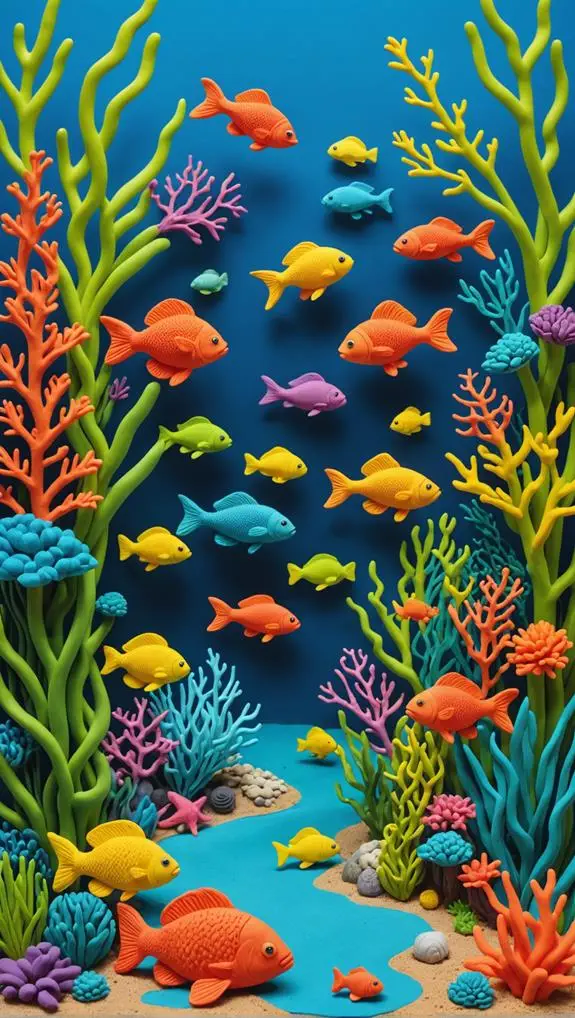
Effective biological filtration plays a crucial role in improving fish health by converting toxic ammonia from fish waste into less harmful nitrates. This process not only keeps your aquatic friends safe but also creates a healthier environment for them to thrive.
Mastering fish tank cycling is essential for establishing beneficial bacteria that support this vital filtration process. Here's how it works:
- Beneficial bacteria in your filter break down organic waste, enhancing water quality and clarity. You'll notice your tank looking cleaner, which is a win-win for both you and your fish!
- By maintaining stable water parameters, biological filtration significantly reduces stress on fish. Less stress means happier fish, and who doesn't want that?
- A well-maintained filtration system minimizes the need for frequent water changes. Less fuss means your fish can chill out in their cozy home instead of getting jolted by sudden shifts in water chemistry.
When you prioritize biological filtration, you're not just keeping your tank clean; you're actively contributing to the long-term health of your fish.
With better water quality and less toxicity, your aquatic buddies can enjoy longer, healthier lives.
Sustainable Ecosystem Support
A thriving aquatic ecosystem relies on the intricate balance of various components, and your biological filtration system plays a key role in maintaining that balance.
By utilizing denitrifying bacteria, your filtration system transforms harmful ammonia from fish waste into less toxic nitrates. These nitrates nourish aquatic plants, promoting a healthy environment that's beneficial for everyone involved.
When you support this process, you encourage nutrient cycling, which helps keep fish populations stable and healthy. Happier fish live longer and experience less stress. Plus, by minimizing harmful waste, you reduce the risk of those dreaded algal blooms, keeping your water clear and inviting.
An effective filtration system also cultivates diverse microbial communities that break down organic matter, making your ecosystem more resilient.
And let's not forget—regular water changes are still important! They complement your filtration efforts, keeping everything in check.
Lower Maintenance Requirements
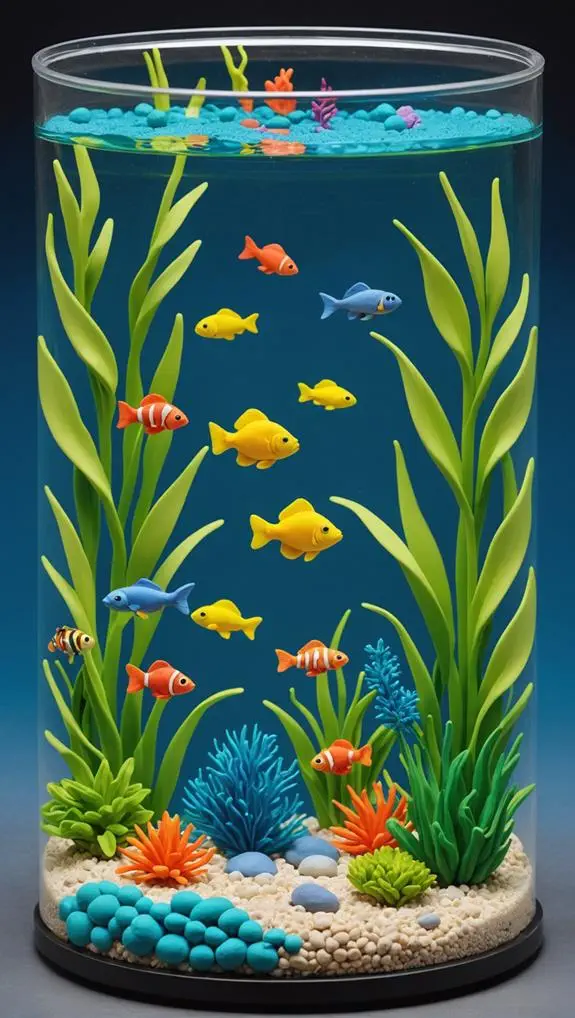
Maintaining a balanced ecosystem through biological filtration not only supports aquatic life but also simplifies your upkeep efforts.
With lower maintenance requirements, you'll find that your time is freed up for enjoying your beautiful aquarium or pond rather than constantly worrying about it.
Here's how biological filtration helps:
- Reduced Water Changes: Thanks to beneficial bacteria, you won't need to change the water as often. That means less hauling buckets and more time to relax.
- Less Monitoring: The consistent breakdown of harmful compounds like ammonia and nitrite means you can check water parameters less frequently. You'll still keep an eye on things, but it won't feel like a full-time job.
- Minimal Cleaning: Unlike traditional filters that clog easily, biological filters require less mechanical cleaning. The bacteria do the heavy lifting, breaking down waste and keeping your filtered water clear and healthy.
With this self-sustaining system, you're not just maintaining your aquatic environment; you're nurturing it.
Enjoy the harmony of your underwater world, knowing that you've made a choice that benefits both you and your aquatic friends!
Effective Waste Breakdown
Through the process of biological filtration, harmful ammonia from fish waste gets efficiently transformed into less toxic nitrates, making your aquarium or pond a safer environment for aquatic life. This happens thanks to beneficial bacteria that colonize your filter surfaces, turning those nasty nitrites into nitrates.
Think of it as a cleanup crew, tirelessly working behind the scenes to keep things tidy!
Not only does this process break down waste, but it also enhances nutrient cycling. By converting organic matter into usable nutrients for plants, you're creating a healthier ecosystem. When the water flow is just right, these bacteria thrive, helping to reduce ammonia and nitrite levels to nearly zero.
That means your fish can swim around without stress, and you won't have to change the water as often—score!
Plus, a balanced bacterial population means fewer water changes and more stable conditions overall. It's like giving your aquatic friends a cozy home where they can flourish.
Temperature and Ph Stability

Biological filtration not only tackles waste management but also plays a significant role in stabilizing pH levels and temperature in your aquatic environment. By promoting the growth of beneficial bacteria, biological filtration helps keep pH levels steady, preventing dangerous fluctuations.
Here's how it works:
- Temperature Stability: A well-established biological filter generates heat through increased microbial activity, which is especially helpful in maintaining warmth in cold water aquariums.
- pH Levels: These bacteria efficiently convert ammonium to nitrites and then to nitrates, minimizing those pesky pH swings that can stress your aquatic friends.
- Healthy Habitats: Most fish and invertebrates thrive best in stable environments, so consistent temperature and pH levels contribute to their overall well-being.
Cost-Effective Filtration Solution
When it comes to effective water management, opting for biological filtration can save you both time and money. You might be wondering how that works. Well, biological filtration systems usually have lower operational costs compared to conventional filtration methods. That means you'll spend less on energy and chemicals, which is a win for both your wallet and the environment!
By using beneficial bacteria to purify water naturally, these systems help reduce harmful pollutants and waste. This not only cuts down the need for frequent water changes but also minimizes associated labor costs.
Plus, you won't need to rely on expensive chemical additives, making it a cost-effective approach to keeping your aquatic environment healthy.
While the initial investment in biological filtration equipment might seem daunting, think of it as a smart move for long-term savings. Improved water quality leads to healthier ecosystems, which means less hassle for you down the road!
Frequently Asked Questions
What Are the Benefits of Biofiltration?
Biofiltration boosts water clarity by enhancing microbial activity and optimizing nutrient removal. You'll ensure cleaner, safer water for your community, promoting health and well-being while minimizing environmental impact and operational costs in water treatment facilities.
Why Is Biological Filtration Important?
You'll find biological filtration vital for your aquarium health. It nurtures nitrifying bacteria, ensuring ammonia removal. This process creates a thriving environment, reducing stress on fish and fostering a balanced ecosystem that benefits all aquatic life.
What Are the Advantages and Disadvantages of Biological Filtration?
When assessing biological filtration, consider its cost effectiveness and low maintenance requirements. However, you should also evaluate its suitability for your specific setup, as initial challenges and efficiency limitations can impact long-term success.
What Are the Benefits of Filtration Systems?
Filtration systems foster fantastic freshness, combining mechanical filtration, chemical filtration, and hybrid systems to cleanse water. You'll ensure safety, sustainability, and satisfaction in serving others, creating healthier habitats and enhancing everyone's experience with cleaner, clearer water.
Final Thoughts
In a nutshell, biological filtration is like a superhero for your aquatic world. It keeps your water clean, reduces the need for harsh chemicals, and helps your fish thrive in a happy, balanced environment. Plus, it's easier on your wallet and requires less maintenance. By supporting a sustainable ecosystem, you're not just caring for your fish; you're nurturing a little slice of nature. So, dive in and let your tank flourish with the magic of biological filtration!

